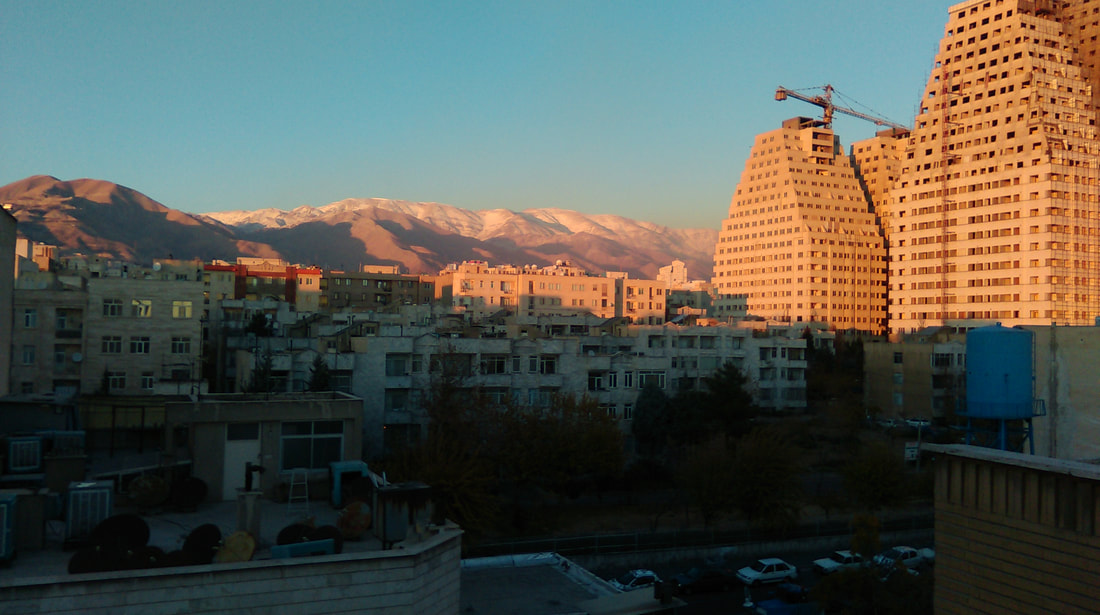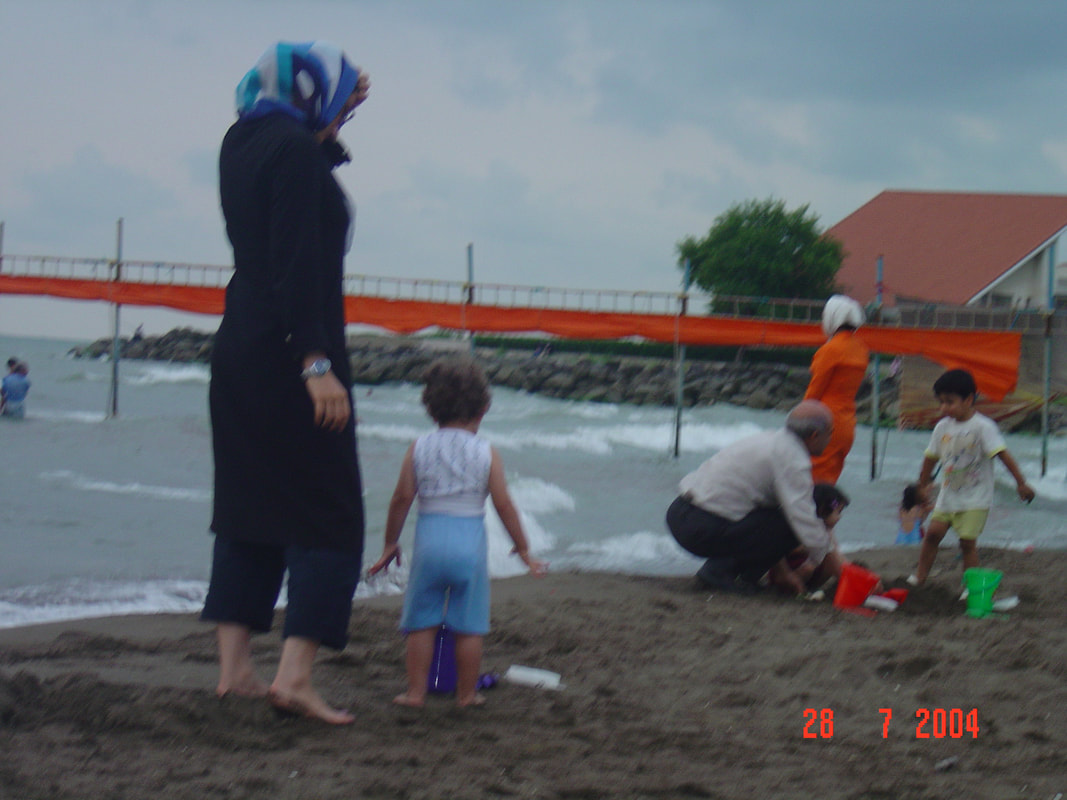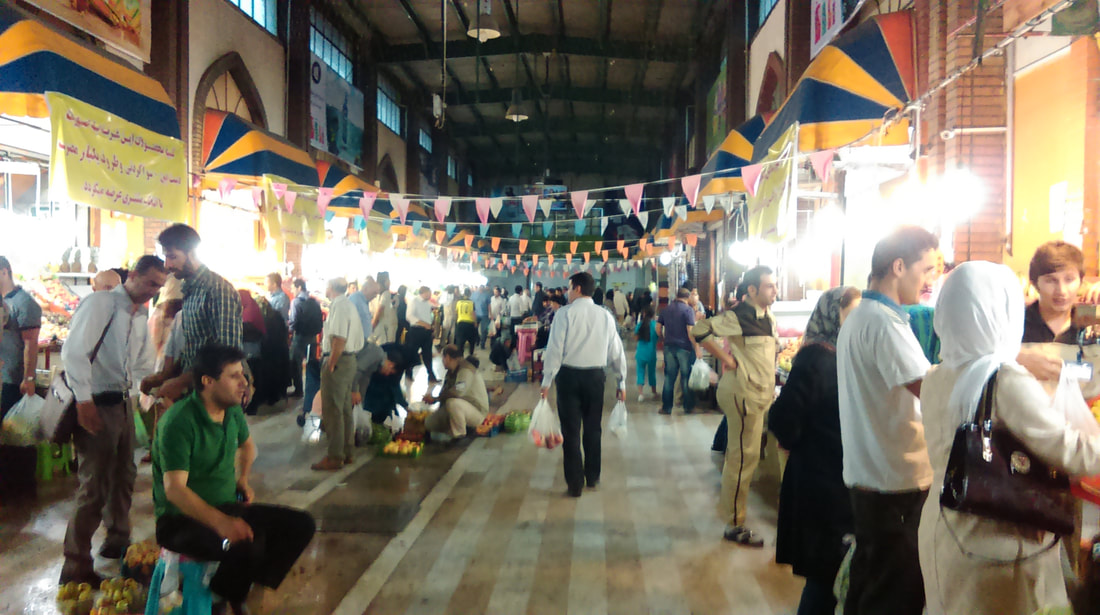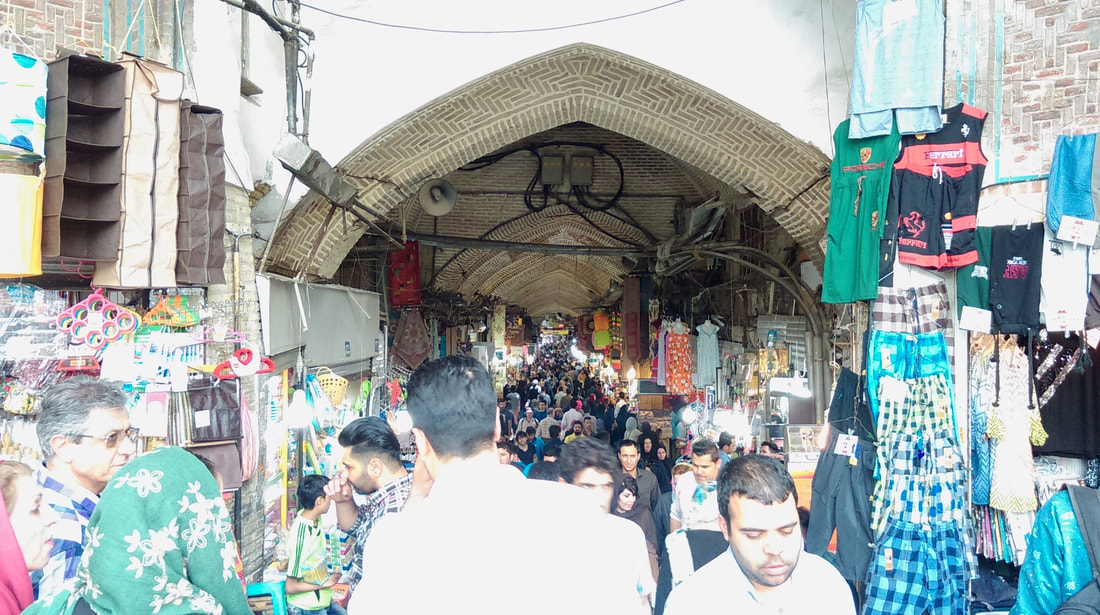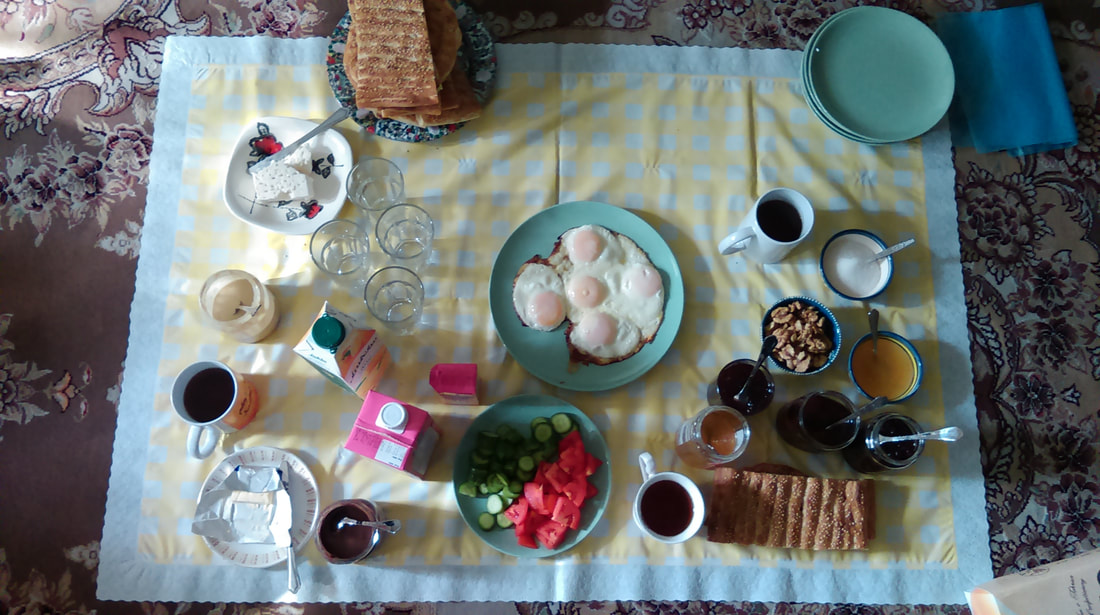Ava
Discussions of Privilege, Education and Religion
|
Growing Up in Iran's Capital
*Ava was born in the capital of the Islamic Republic of Iran, the city of Tehran. Tehran is the home of over seven million people and 12 to 15 million living in the surrounding metropolitan area. Starting with the turn of the century, the majority of families residing in Tehran lived in nuclear units rather than with extended families. For the first 24 years of her life, Ava lived in the same apartment with her parents and two older siblings. *Not her real name |
Ava’s Family and Religion during Childhood
The Central Intelligence Agency’s World Factbook states that 99.4 percent of Iranians as being Muslim, the majority of that population being Shi’ah Muslims. But when asking about religion, Ava describes her childhood reality, and her experiences tell a much different story.
“I didn’t grow up religious, my sister and brother were never religious, I would say, but my family went in and out of religion or religious practices frequently, ” said Ava.
As examples Ava explained, “My dad would drink every night,” something forbidden to Muslims in the Quran. “My mom didn’t wear the hijab, but she would pray five times, like she’s supposed to do if she’s a Muslim. She started wearing the hijab after my dad passed away when I was nine. But then after a couple of years she stopped praying. So [my parents] weren’t very much into the practice of Islam.”
Even though her family’s practices weren’t always traditional, her parents both believed in God. “I was always told ‘we are Muslim,’ although I stopped practicing anything when I was in high school or after high school.”
The Central Intelligence Agency’s World Factbook states that 99.4 percent of Iranians as being Muslim, the majority of that population being Shi’ah Muslims. But when asking about religion, Ava describes her childhood reality, and her experiences tell a much different story.
“I didn’t grow up religious, my sister and brother were never religious, I would say, but my family went in and out of religion or religious practices frequently, ” said Ava.
As examples Ava explained, “My dad would drink every night,” something forbidden to Muslims in the Quran. “My mom didn’t wear the hijab, but she would pray five times, like she’s supposed to do if she’s a Muslim. She started wearing the hijab after my dad passed away when I was nine. But then after a couple of years she stopped praying. So [my parents] weren’t very much into the practice of Islam.”
Even though her family’s practices weren’t always traditional, her parents both believed in God. “I was always told ‘we are Muslim,’ although I stopped practicing anything when I was in high school or after high school.”
|
Religious, or Non-Religious Acceptance
When asked about the ease or difficulty of being non-religious in an Islamic state, Ava explained her perceptions from two points of view: her family and society. “In my family it was totally okay to not practice Islam,” Ava said. Her mother has never questioned her practices, or non-practices of Islam, although she has always encouraged Ava to believe in God; Ava said it makes her mother sad when Ava disagrees with her. But Ava has found her own way and is confident in the person she has become. “[When I was young], I had close friends living upstairs who were very, very religious. I would go to the Mosque with them as a child and pray. Now that I look back, I’m like ‘wow,’ that’s very different than who I am now, who I became later on after my childhood.” |
Religion in Iranian Society
Iran is a theocratic republic governed under a religious legal system based on both secular and Islamic law. Iran’s head of state and the ultimate religious and political authority is granted to a religious scholar called the ‘Supreme Leadership Authority,’ or the ‘Supreme Leader.’
Shi’ah Muslims, such as is the majority of Muslims in Iran, follow the guidance of seminary-trained clerics including the Supreme Leader. Iran’s current Supreme Leader is Ali Khamenei, who has life tenure in the position and has been in office since June 4, 1989.
“In Iranian society there are people who think you have to be religious and if they see evidence of you not being religious then they would either try to talk you into it or look down upon you,” said Ava. “That’s the religious part of society, which I now realize is the majority. But then there are people around me who I used to think were the majority - who didn’t care or weren’t religious at all, they wouldn't practice anything, who wouldn’t judge you for anything.”
Ava described her environment post-high school as being highly academic where she spent most of her time with other non-religious Iranians.
“It was a major realization for me that just because people around me aren’t religious doesn’t mean that Iranians in general aren’t religious or that a typical Iranian is not religious. I was born in Tehran and the capital is the most modern place in the country and I would hang out with people who are like me so it makes sense for them to not be religious. But it doesn’t mean that Iran is not a religious country.”
Iran is a theocratic republic governed under a religious legal system based on both secular and Islamic law. Iran’s head of state and the ultimate religious and political authority is granted to a religious scholar called the ‘Supreme Leadership Authority,’ or the ‘Supreme Leader.’
Shi’ah Muslims, such as is the majority of Muslims in Iran, follow the guidance of seminary-trained clerics including the Supreme Leader. Iran’s current Supreme Leader is Ali Khamenei, who has life tenure in the position and has been in office since June 4, 1989.
“In Iranian society there are people who think you have to be religious and if they see evidence of you not being religious then they would either try to talk you into it or look down upon you,” said Ava. “That’s the religious part of society, which I now realize is the majority. But then there are people around me who I used to think were the majority - who didn’t care or weren’t religious at all, they wouldn't practice anything, who wouldn’t judge you for anything.”
Ava described her environment post-high school as being highly academic where she spent most of her time with other non-religious Iranians.
“It was a major realization for me that just because people around me aren’t religious doesn’t mean that Iranians in general aren’t religious or that a typical Iranian is not religious. I was born in Tehran and the capital is the most modern place in the country and I would hang out with people who are like me so it makes sense for them to not be religious. But it doesn’t mean that Iran is not a religious country.”
|
Ava’s Advanced Academics
Tehran is home to the largest number of universities in Iran made up of both public and private institutions. Following completion of high school, Iranian students take the highly competitive Iranian University Entrance Exam, the Konkour. While many public and private universities use the scores from the Konkour to admit students, the Islamic Azad University requires a separate entrance exam. Founded in 1982 after Iran’s revolution, Azad University is now in the top five of the largest universities in the world. After graduating high school and taking the Konkour, Ava was admitted to a public university but not in the major she wanted. Instead, she selected the major she was admitted to at Azad University and ended up attending for both her undergraduate and master’s degrees. |
While at Azad University Ava met another Iranian while working at a language institute. The pair started dating in 2007 or 2008 but were parted when he left Iran to attend university in the United States. Soon after they decided to get married and Ava moved to the U.S. on a student visa upon completion of her own master’s degree.
Perceptions of Islam in America
I asked Ava if religion played a part in her wedding, either due to pressure from the family or her husband's religious beliefs. She was adamant it had not.
“[Religion] is not a part of our lives; we’re not religious. We don’t even consider ourselves Muslims or anything else. [Religion] does play a role because of where we come from. There have been times that people think that we’re Muslims just because we’re from Iran and ask us about a religious occasion coming up.” At that point Ava laughed and stated that she doesn’t know anything about Islamic religious holidays and doesn’t celebrate them.
“[Islam] is kind of inseparable in the conversations we have with outsiders. You’re stereotypically a Muslim if you’re from Iran, which is so not true for me.”
Perceptions of Islam in America
I asked Ava if religion played a part in her wedding, either due to pressure from the family or her husband's religious beliefs. She was adamant it had not.
“[Religion] is not a part of our lives; we’re not religious. We don’t even consider ourselves Muslims or anything else. [Religion] does play a role because of where we come from. There have been times that people think that we’re Muslims just because we’re from Iran and ask us about a religious occasion coming up.” At that point Ava laughed and stated that she doesn’t know anything about Islamic religious holidays and doesn’t celebrate them.
“[Islam] is kind of inseparable in the conversations we have with outsiders. You’re stereotypically a Muslim if you’re from Iran, which is so not true for me.”
|
Privilege of Not Being Visibly ‘Other'
Ava doesn’t think she’s ever faced backlash either from being Iranian or from being misperceived as being a Muslim. “I’ve thought about this a lot, but I think part of it is because I don’t ‘look like a Muslim.’” She explained, “I don’t wear a hijab and I’m sure it’s different for people who do. The first impression that I give [others] is not that I’m a foreigner. A lot of the time I don’t think lay people notice that I’m not from the U.S.” Ava, who is light-skinned, and has a clear accent, recognizes her privilege. “Most of my time is spent in academic communities. I’m on campus most of the time in Saint Louis, where my husband lives. My interactions are with educated people mostly. It’s really a privilege.” |
But Ava is aware of the potential for backlash against her nationality. She shared a story from when she was once confronted on the street by a man who asked where she was from. The encounter made her nervous so she said, “I’m from here.”
The man didn’t believe her and confronted her by saying, “You have a different accent. You’re not from here.”
Ava described the ever-present knowledge that being from Iran could alter the discourse between her and a stranger. “I always feel very, very conscious when I have to say that I’m from Iran. And I’m always expecting at least a surprised reaction from whoever I’m talking to if they don’t know me.”
The man didn’t believe her and confronted her by saying, “You have a different accent. You’re not from here.”
Ava described the ever-present knowledge that being from Iran could alter the discourse between her and a stranger. “I always feel very, very conscious when I have to say that I’m from Iran. And I’m always expecting at least a surprised reaction from whoever I’m talking to if they don’t know me.”
|
What Does it Mean to Ava to Be an Iranian Woman?
“I don’t want to paint everyone with the same brush,” said Ava. “I’m not a representatives of everyone.” But she does have a unique story to tell. “All the years of life I had in Iran, as someone who had to follow societal rules and religious norms I didn’t want to, but also someone who was able to feel that I belonged and am an important part of my society. I am defined by all of these experiences, which are positive and negative, but very different than what people think, what the media portrays.” Media representation and portrayals are the core of this profile series meant to engage in new perspectives from Iranian women. |
“A lot of women struggle to be what they want to be in Iran,” said Ava. “But a lot of them are successful, in some extent, to the extent this is allowed by the rules and regulations. But there were constraints on certain things. If I wanted to hang out with my friends after midnight in the streets it wasn’t 100 percent possible. There were risks. In my job [in Iran] if I wanted to practice some of the freedoms I wanted to practice, I wasn’t able to because it was an organization that was owned by the government and I had to wear a different type of hijab and be very cautious about what I did and what I said just because I wanted to keep the job, the well-paying job.”
A vast majority of Western media tends to focus on the lack of freedom women experience in Iran, but Ava pointed out that those portrayals didn’t always align with her reality. “I did have a lot of the freedoms that the media says women don’t have; it was normal for women to drive, to have jobs.”
Ava also explained that her experience, while not universal, was shared with other women around her. Both among other non-religious Iranians, and religious Iranians. “I’m friends [with people who are very religious] and I don’t have anything against them. They’re as modern as I am in terms of social activities, and are still religious. I wasn’t alone. I lot of women I know that were able to [have similar levels of freedom].”
A vast majority of Western media tends to focus on the lack of freedom women experience in Iran, but Ava pointed out that those portrayals didn’t always align with her reality. “I did have a lot of the freedoms that the media says women don’t have; it was normal for women to drive, to have jobs.”
Ava also explained that her experience, while not universal, was shared with other women around her. Both among other non-religious Iranians, and religious Iranians. “I’m friends [with people who are very religious] and I don’t have anything against them. They’re as modern as I am in terms of social activities, and are still religious. I wasn’t alone. I lot of women I know that were able to [have similar levels of freedom].”
Photos and caption descriptions were provided by Ava.
